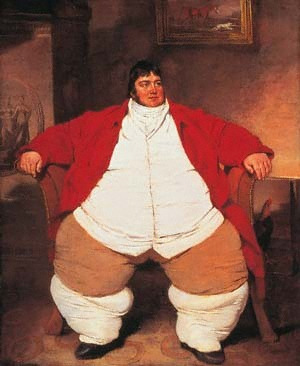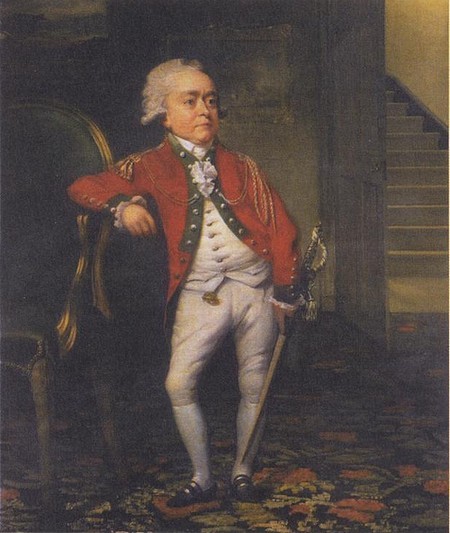#daniel lambert
Hello. We started this blog in March last year and now we’re really close to finding out why every single day is BRILLIANT. So we’d just like to say a huge thank you to everyone who has read, liked and re-posted our sometimes excessively long ramblings. It’s been a lovely thing to reach so many people across the world from our small corner of rural North Yorkshire. If we make it, and I think we might, there will be two more posts after this one. If you’re not completely fed up with us pestering you every day about things that happened ages ago, you can also find this blog on Wordpress, along with a short explanation of how it came about, and in which we reveal which of us has actually written all of this on the ‘about’ page.
Why March 13th is BRILLIANT
Extra Large
Today is the birthday of Daniel Lambert. He was born in 1770 at Blue Boar Lane in Leicester, England. His father was the keeper of Leicester goal. Daniel wasn’t always this huge. He was an athletic young man, fond of field sports and a keen swimmer. For much of his life, he taught local boys how to swim. At fourteen, he was made apprentice at an engraving and die casting works in Birmingham, but the business went into decline and he returned to Leicester around 1788 where he assisted his father at the gaol. Soon after that his father retired and Daniel took over his job as gaol keeper. A gaol, we should explain, was not the same as a prison. It might hold the recently convicted who were awaiting transfer to prison, but they might also be about to be transported or even hanged. It also held people who were awaiting trial. Daniel had a good reputation as a gaol keeper, he assisted people with their trials and many expressed gratitude when they left.
It was around the time that he became gaoler that his weight began to increase. He was sure that he didn’t over eat and he didn’t drink alcohol, so he was really unable to account for it. By 1793, he weighted 32 stone (450 lb, 200 kg). This did bother him and he applied his spare time to exercise. He built up his strength until he was easily able to carry five hundred weight (that’s 560 lb or 250kg). There is a story, which we hope is true, that he was happy to challenge anyone to a race, providing he had a slight head start. He would then lead the race down the narrow lanes of the city. He always won because nobody could get past him. Daniel may not have been fleet of foot but he doesn’t appear to have been severely restricted by his size. He could easily walk for miles without tiring, he could stand on one foot and kick his legs high in the air. He also continued to teach swimming and could stay afloat with two men sitting on his back.
Then, there was the time he had a fight with a bear. He was watching a dancing bear perform in Blue Boar Lane when his dog slipped its leash. The dog had once been a circus performing animal and did not care for bears. He bit it. The bear turned on the dog and Daniel asked its keeper to restrain it so he could save his dog. Instead of that, the keeper removed the bears muzzle. Daniel grabbed a stick and hit the bear with it and then punched it in the head. It distracted the animal for long enough for his dog to get away. The performers who owned the bear were pretty upset about the whole thing and complained to the Mayor. The Mayor asked where this had happened. When they mentioned Blue Boar Lane, his reply was along the lines of; that’s outside of my jurisdiction, those people in Blue Boar Lane, they do what they want. The performers stayed away form Blue Boar Lane for two years. They did consider returning sooner, but when they spotted Daniel sitting outside his house, they thought better of it.
In 1805, Daniel’s gaol was closed and he lost his job. He was granted an annuity of £50, but it wasn’t really enough to live on. He was rather sensitive about his weight but none the less, it made it difficult for him to find other work. He now weighed around 50 stone (700 lb, 318 kg) His only option was to exhibit himself as a curiosity. In April 1806, he travelled to London in a specially built coach. He resided in Piccadilly, where he received visitors for five hours each day, charging a shilling to each person. At this point, we need to explain that people at that time didn’t consider it a terrible thing to be so overweight, they just found him a marvellous spectacle. It became rather fashionable amongst the middle and upper classes of London to visit him and be his friend. He would talk with his visitors about sports, about dogs and about animal husbandry. Sometimes up to four hundred people a day would visit him. Daniel was a huge success. He also wisely declined all offers from agents and impresarios who wanted to manage him.
Most of his guest were polite, but he did start to get fed up with being asked the same old questions. They were particularly fixated on how much his clothes cost. When he was asked, yet again, how much his coat had cost him his reply was: “I cannot pretend to charge my memory with the price, but I can put you into a method of obtaining the information you want. If you think proper to make me a present of a new coat, you will then know exactly what it costs.” Fair enough. When another man insisted on being told because he had a right to know what his shilling was paying for, Daniel replied that if he knew what part of his next coat the man’s shilling would pay for he would: “gladly cut it out.”
During his time in London he was visited by Józef Boruwłaski who was probably the last of Europe’s 'court dwarfs’. Józef was 3’ 3’’ (99 cm) and slightly built, Daniel was 5’ 11’’ (1.8 m). On this occasion, Daniel didn’t mind discussing his clothes and they decided that one of his sleeves had enough material to make a whole coat for Józef. There is something in human nature that loves to put a very big thing and a very small thing next to each other and then have a look at them. So the meeting of Daniel and Józef was a cause of great delight to anyone who witnessed it. One newspaper reported that it was like John Falstaff meeting Tom Thumb and 'a double treat for the curious.’
Daniel returned to Leicester only six months later, a wealthy man. He later made other, shorter, tours of the provinces and seemed generally in good health. But on June 21st 1809, he suddenly collapsed and died at an Inn at Stamford. He was thirty-nine. There was no question of transporting his body back to Leicester, so he was buried there. His coffin, which was built with wheels, was so huge that they had to remove a window and demolish part of the wall just to get it out of the building. His grave was dug with a sloping approach so they wouldn’t have to lower his coffin into the ground. Even so, it still took twenty men half an hour to manoeuvre it into the ground.
Daniel Lambert became a cult figure and his first biography was printed later that year. Almost every item of his clothes and his possessions were quickly bought up by collectors and can still be seen in museums today. Even a hundred years after his death the name 'Daniel Lambert’ was synonymous with anything that was exceptionally large. As this is now our 364th consecutive daily post, today we are feeling like the Daniel Lambert of historical blogging. If you’re following this on Tumblr, you will be able to wheel us into the ground on Tuesday evening. If you’re reading this on Wordpress, We will be at large until July.
Post link


